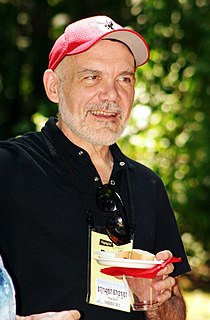A Quote by Lorin Stein
I regret that there aren't more short stories in other magazines. But in a certain way, I think the disappearance of the short-story template from everyone's head can be freeing. Partly because there's no mass market for stories, the form is up for grabs. It can be many, many things. So the anthology is very much intended for students, but I think we're all in the position of writing students now. Very few people are going around with a day-to-day engagement with the short story.
Quote Topics
Anthology
Around
Because
Certain
Certain Way
Day
Day-To-Day
Disappearance
Engagement
Everyone
Few
Few People
Form
Freeing
Going
Head
I Regret
Intended
Magazines
Many
Market
Mass
Mass Market
More
Much
Now
Other
Partly
People
Position
Regret
Short
Short Stories
Short Story
Stories
Story
Students
Things
Think
Up
Very
Way
Writing
Related Quotes
I'm one of those writers who started off writing novels and came to writing short stories later, partly because I didn't have the right ideas, partly because I think that short stories are more difficult. I think learning to write short stories also made me attracted toward a paring down of the novel form.
I started writing the book without realizing I was writing a book. That sounds stupid, but it's true. I'd been trying and failing to make a different manuscript work, and I thought I was just taking a break by writing some short stories. I'm not a very good short story writer - the amazing compression that is required for short stories doesn't come easily to me. But anyway, I thought I'd try to write some short stories. And a structure took shape - I stumbled upon it.
I've always loved short stories. Even before I was a writer I was reading short stories - there were certain writers where I just felt like they could do in a short story what so many writers needed a whole novel to do, and that was really inspiring to me. Alice Munro, I felt that way about from an early time. Grace Paley.
It used to be that you would go into a writing program and what you would learn was how to write a short story. You would pick up the magazines and you would be taught from the magazines how to write a short story. Nowadays student writers are learning to write novels because that market is gone, so the ones who are drawn to the form are doing it really for reasons of their own and that's really exciting.
I made some shorts that I'm not in. I think because I write so many short stories, it's not that hard to come up with characters that are not me. But my way into making movies has been through performing. My very first short film, I played a child and her own mother. So in some ways, to me, my great achievement so far is just that I've gotten all these other people to play the other parts. That's what makes it a real movie.
A lot of people who want to see the short story have a renaissance of readership - they tend to think of short stories, and sometimes poems too, as being well-suited to the way we now live, with all of these broken-up bits of time. I hope they're right, but my sense is that our fiction reading has become, if anything, more cherished as a kind of escape from fragmentation.
I started writing because I wanted to write scripts, but I wasn't very good at it. Then I started writing short stories, sort of as treatments for the film scripts, and I found I enjoyed writing short stories far more than I enjoyed writing film scripts. Then the short stories got longer and longer and suddenly, I had novels.
I like to write short stories more because I never met a writer who wasn't lazy. And a short story is, by its very definition, short. It is something that generally you can turn out in a week to two weeks depending on how well it goes for you. But, at the same time, it gives the same satisfaction of creating a complete world.
I began as a poet, moved to short fiction, then to novel writing, and, for the past twelve years, back to stories. I sometimes wonder if the pendulum will swing all the way back to where I began. As T.S. Eliot says, "In my end is my beginning," but for now I'm staying put, sitting tight, and loving the short story form way too much to leave it quite yet.
































